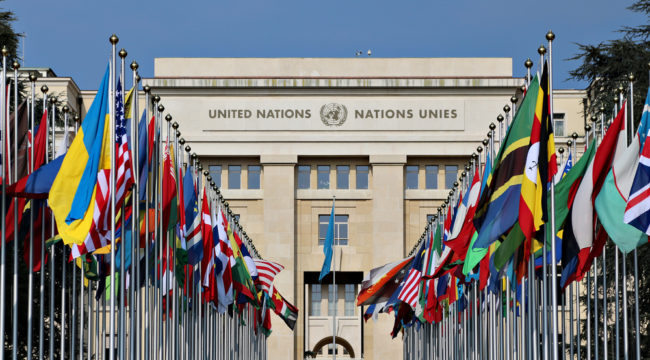Elites Secretly Plan “Global New Deal”
In the 1930s, elites said the New Deal would haul the country out of the Great Depression (it didn’t).
Now some elites say a “Global New Deal” is needed to shake the fading world economy out of the Great Recession…
The U.N.’s Conference on Trade and Development just released its annual report. Bearing the sugary title “Structural Transformation for Inclusive and Sustained Growth,” it’s actually a rip-roaring manifesto for a global new deal. And they admit it. Quote:
“A global new deal will need to move beyond business as usual.” That, of course, will require “effective international cooperation and action.”
Strong stuff. What would a global new deal entail, exactly?
Truckloads of public spending on everything, alpha to omega. Taxes to kingdom come. Red tape and regulations beyond even that. Global wealth redistribution. Welfare. Here’s a dose, the authors indulging their fondness for commas to the full:
“The policy package in developed economies will need to combine a proactive fiscal stance, both on spending and taxation, with supportive monetary and credit policies, stronger financial regulations and redistributive measures through an incomes policy, minimum wage legislation, progressive taxation measures and welfare-enhancing social programs.”
Lots like the original New Deal.
The report also demands a return to the “developmental state” with its “production transformation policies” — the latter being out-of-town jargon for something less sweet: crony capitalism.
“Production transformation policies” is the kind of fimble-famble bureaucrats use to make trouble for honest words. And the one thing they can’t afford is honesty. No bureaucracy can. Here’s a stab at the “developmental state,” if you can penetrate the fog:
“Active industrial policies require a supportive institutional geometry of developmental states, government-business dialogue and ‘reciprocal control mechanisms’ that ensure government support translates into desired actions by the private sector.”
Note well the words “control,” “government” and “desired actions.”
Jim Rickards calls obscure reports like this “silent dog whistles” elites use to communicate with each other. The information is open to the public. But only those in the know can decipher the coded messages behind the official gobbledygook.
Question: Are these elites putting their plan into action right now?
In April, global elites reached a climate agreement in Paris. And it’s about to become binding after 31 nations officially joined the accord in New York this Wednesday. It could be fully ratified by the end of the year.
Jim predicted global institutions will use climate change as a stalking horse for something more… sinister:
Climate change is a convenient platform for world money and world taxation. That’s one way the elites could sell their plans to the public. It’s inflation masquerading as “saving the planet,” “climate justice,” or what have you… If you have a global problem, then you can justify global solutions. A global tax plan to pay for global climate change infrastructure with world money is the end game.
The endgame? Jim’s been beating his tom-toms lately about special drawing rights (SDRs). That’s the IMF’s “world money” and Jim says elites plan to use it to replace the dollar in global trade. He’s also said global elites could resort to “helicopter money” to generate their blessed inflation.
What does climate change have to do with SDRs… helicopter money… and a “Global New Deal”?
Don’t think that climate change is unrelated to the international monetary system. (IMF head) Christine Lagarde almost never gives a speech on finance without mentioning climate change. The same is true for other monetary elites. They know that climate change is their path to global financial control.
The (April) climate agreement may have really just been a disguised helicopter money scheme. Spending on emission reduction programs and infrastructure could total about $6 trillion per year, which would be carried out by the IMF through the issue of special drawing rights (SDRs).
The U.N. report hints at an expanded role for the IMF. If our bureaucratese is up to snuff, that is. Mandarin is easier to translate:
There are signs that international bodies, such as the IMF, are rethinking their approach to macroeconomic adjustment. The necessary next step is for them to… consider the wide range of actions needed to diversify the structure and level of sophistication of economic activity.
Clear as mud. And probably not by accident…
A global new deal. The world could be one good recession away from it becoming a reality.
Regards,
Brian Maher
Managing editor, The Daily Reckoning
Ed. Note: The most entertaining and informative 15-minute read of your day. That describes the free daily email edition of The Daily Reckoning. It breaks down the complex worlds of finance, politics and culture to bring you cutting-edge analysis of the day’s most important events. In a way you’re sure to find entertaining… even risqué at times. Click here now to sign up for FREE.



Comments: